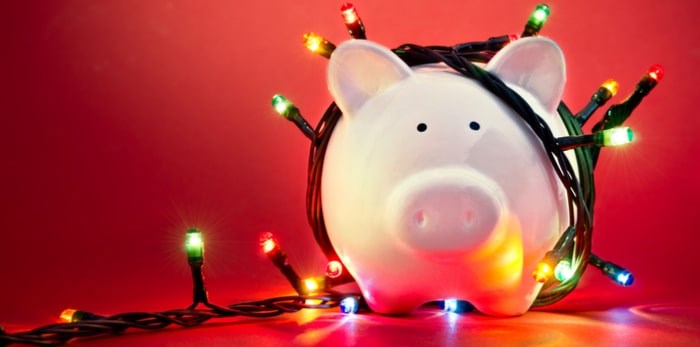As a complex and challenging 2018 comes to an end, Canadians report little change in their economic status compared with one year ago. In a nationwide Research Co. survey conducted earlier this month, 27 per cent of Canadians say they are better off financially than they were last year, while 49 per cent say their situation has not changed and 22 per cent acknowledge being worse off now.
The year that is about to end brought municipal elections in several provinces, as well as provincial ballots in the two most populous ones – Ontario and Quebec – that resulted in government changes. In spite of this, the views of Canadians have not gone through extraordinary shifts when it comes to the purchasing power of their households.
 Christmas money/Shutterstock
Christmas money/Shutterstock
A financial momentum score can be created by looking at the proportion of residents who say things are better now and subtracting those who say their situation has worsened. In this analysis, the entire country stands at +5. but there are some regional disparities. Atlantic Canada (at +12) and Manitoba and Saskatchewan (at +10) fare better than other jurisdictions. Alberta (at +4) and Ontario (at +3) are at the bottom.
Every province in the country posted a positive momentum score on personal finances at the end of the year. This has not always been the case in Canada. In 2008, at the height of the mortgage crisis in the United States, only Albertans were in the black. When oil prices plummeted in 2016, Alberta trailed all other provinces on economic confidence.
It is clear that Canadians are in a better mood when it comes to their personal economic standing, but this is not directly reflected in the budget that they have in mind for holiday spending. Only 11 per cent of Canadians say they are planning to spend more on gifts this year than they did in 2017, and two in five (39 per cent) are going to spend less.
On this question, we see a swing: from a nationwide momentum score of +5 on personal finances to a drastic -28 on whether Canadians will devote more money to gifts during the holiday season.
While 2018 may have been better financially for some Canadian households, the high proportion of frugal holiday spenders suggests that there is more uncertainty about the future in the eastern provinces than in the west.
Using the same momentum score metric, we see that three areas have the largest difference between “spending more” and “spending less” on gifts this year: Ontario (-35), Quebec (-29) and Atlantic Canada (also -29).
The western provinces fare much better on this analysis, although residents are not particularly extravagant: Manitoba, Saskatchewan and British Columbia at -21 and Alberta at -16.
Our spending habits during the holidays have changed significantly over the years, with online shopping becoming more prevalent and big box stores being displaced or repurposed in various municipalities. With this in mind, the survey also looked at the more personal side of gifting, and asked Canadians whether they prefer to receive an item a person chose for them or a gift card they can use at a store or online to get something they can select.
It turns out Canadians are evenly split on this matter, with 48 per cent saying they prefer to receive gifts and 47 per cent saying they favour gift cards.
British Columbians are the most traditional – with 54 per cent saying they prefer an actual item than a gift card during the holidays – followed by Ontarians (50 per cent). In Alberta and Quebec, 51 per cent of residents expressed a preference for a gift card.
There are some generational differences as well. Canadians aged 18 to 34 were evenly divided, but 54 per cent of those aged 55 and over prefer to receive actual items.
While cyberspace has been flooded with articles on traditions that the younger generation has supposedly killed, the holiday season is definitely not on the list. Among all demographics in the survey, residents aged 18 to 34 have the best momentum score on holiday spending (-10, compared to the national average of -28). Baby boomers (at -21) and generation X (at -34) are decidedly grinchier.


